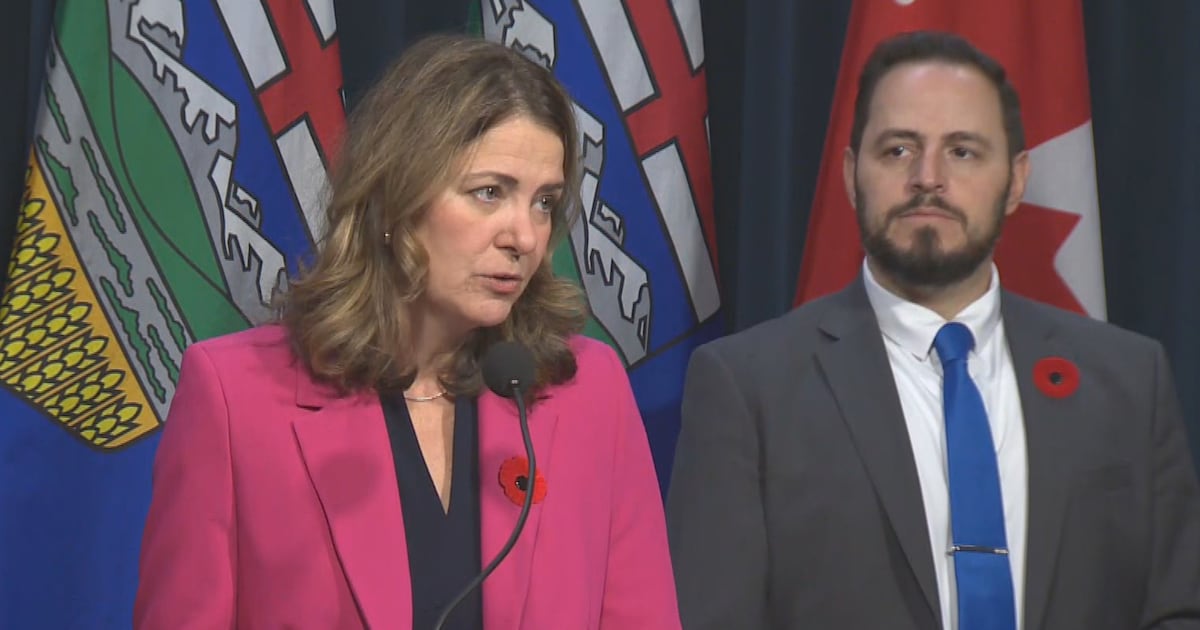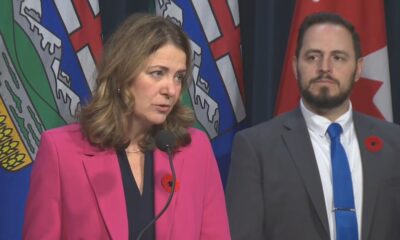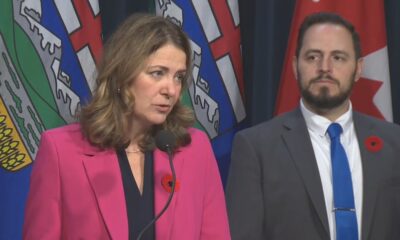Education
Alberta Premier Launches Committee to Tackle Classroom Challenges

Alberta Premier Danielle Smith announced on September 30, 2023, the formation of the Class Size and Complexity Cabinet Committee to address the pressing issues of overcrowded and complex classrooms in the province. This initiative responds to long-standing challenges that have impacted negotiations between the government and Alberta teachers. During a press briefing in Calgary, Smith emphasized the need for a coordinated approach to tackle the diverse needs of students, particularly those requiring additional support.
The newly formed committee, which includes 11 members, aims to engage various stakeholders in discussions about classroom complexity. Education Minister Demetrios Nicolaides was also present during the announcement, underscoring the importance of input from teachers and educational professionals. “These issues create challenges for teachers, educational assistants as well as students, and we want to work with you to deal with them head-on,” Smith stated.
The committee’s establishment follows the creation of a 25-member expert panel earlier this year tasked with examining class size and complexity in Alberta schools. This comes shortly after the government enacted Bill 2, which mandated teachers to return to work amid ongoing disputes over working conditions.
Addressing Classroom Needs
During her radio program, “Your Province, Your Premier,” Smith elaborated on the committee’s objectives. She noted that many students have complex needs, necessitating collaboration among various ministries, including children’s services and mental health. “This is the approach that we think is going to be able to leverage all of the dollars that we have to support these kids with very high needs,” she explained. By bringing together various departmental resources, the committee aims to foster a more supportive and less chaotic teaching environment.
The Alberta Teachers’ Association (ATA) criticized the previous panel for its lack of teacher representation, arguing that teachers’ insights are essential for meaningful reform. Smith acknowledged the importance of teacher input and assured that this time, there will be outreach to various groups to gather perspectives. “We will be reaching out to different stakeholder groups, organizations, and individuals, inviting them to share a perspective,” Nicolaides stated.
Challenges in Class Sizes and Resources
Smith highlighted the disparity in classroom sizes across the province, particularly in urban areas like Calgary, Edmonton, and Red Deer. She pointed out that the average teacher-to-student ratio should ideally be around 13 or 14 to one, based on the number of teachers and students in Alberta. However, the reality is complicated by the number of teachers not currently in the classroom.
She proposed that converting some substitute teachers into full-time positions could help alleviate the burden on current educators. “If we have the same complexity across the board, you do need to have those extra hands to be able to do small classroom support,” she said. The allocation of educational assistants is another area of concern, with some districts having significantly more resources than others, impacting the support available to students with additional learning or medical needs.
The Premier acknowledged the varying situations across different districts, making negotiations challenging. “We want to achieve the outcome,” she affirmed, emphasizing the need for tailored solutions.
The government’s approach to these educational challenges has sparked controversy, particularly following the enactment of Bill 2, which allows for the ordering of teachers back to work. The ATA has announced plans to legally challenge this legislation, asserting that it undermines teachers’ rights. ATA President Jason Schilling stated, “This legal action is not symbolic; it is necessary. We’re standing up for the Charter itself.”
As the new committee begins its work, the emphasis will be on creating a more effective educational framework that prioritizes the needs of students and supports teachers in their vital roles.
-

 World4 months ago
World4 months agoScientists Unearth Ancient Antarctic Ice to Unlock Climate Secrets
-

 Politics3 days ago
Politics3 days agoSecwepemc First Nation Seeks Aboriginal Title Over Kamloops Area
-

 Entertainment4 months ago
Entertainment4 months agoTrump and McCormick to Announce $70 Billion Energy Investments
-

 Lifestyle4 months ago
Lifestyle4 months agoTransLink Launches Food Truck Program to Boost Revenue in Vancouver
-

 Science4 months ago
Science4 months agoFour Astronauts Return to Earth After International Space Station Mission
-

 Technology2 months ago
Technology2 months agoApple Notes Enhances Functionality with Markdown Support in macOS 26
-

 Top Stories4 weeks ago
Top Stories4 weeks agoUrgent Update: Fatal Crash on Highway 99 Claims Life of Pitt Meadows Man
-

 Sports4 months ago
Sports4 months agoSearch Underway for Missing Hunter Amid Hokkaido Bear Emergency
-

 Politics3 months ago
Politics3 months agoUkrainian Tennis Star Elina Svitolina Faces Death Threats Online
-

 Politics4 months ago
Politics4 months agoCarney Engages First Nations Leaders at Development Law Summit
-

 Technology4 months ago
Technology4 months agoFrosthaven Launches Early Access on July 31, 2025
-

 Top Stories2 weeks ago
Top Stories2 weeks agoFamily Remembers Beverley Rowbotham 25 Years After Murder



















